Abstract
Human 6-phosphofructokinase (PFK; ATP:D-fructose-6-phosphate 1-phosphotransferase, EC 2.7.1.11) is under the control of structural loci that code for muscle (M), liver (L), and platelet (P) subunits, which are variably expressed in different tissues; human diploid fibroblasts and leukocytes express all three genes. Random tetramerization of these subunits produces various isozymes, which can be distinguished from one another by ion exchange chromatography or by subunit-specific monoclonal antibodies. We have examined 17 somatic cell hybrids established between Chinese hamster cells and human diploid fibroblasts or leukocytes for the expression of L-type subunits of human PFK. As electrophoresis does not distinguish between Chinese hamster PFKs and human PFKs, we used an anti-human L-subunit-specific monoclonal antibody, which does not react with chinese hamster PFKs. The expression of human L subunits in the hybrids was detected by the enzyme-immunoprecipitation technique using staphylococci bearing protein A as an immunoadsorbent. Twelve out of 17 hybrids expressed human L subunits and retained chromosome 21, as determined by chromosome and isozyme marker analysis, whereas 5 did not express human PFKL and lacked chromosome 21. The mean erythrocyte PFK of seven individuals with trisomy 21 was found to be elevated (147% of normal). A specific increase in L subunits in trisomic erythrocytes was evident chromatographically by a striking increase in L4 species (50%; normal 10%) and immunologically by decreased precipitation with anti-M monoclonal antibody (50%; normal 80%). We conclude from these data that PFKL is located on chromosome 21 and that the previously noted elevation of erythrocyte PFK activity in individuals with trisomy 21 is due to a gene-dosage effect.
Full text
PDF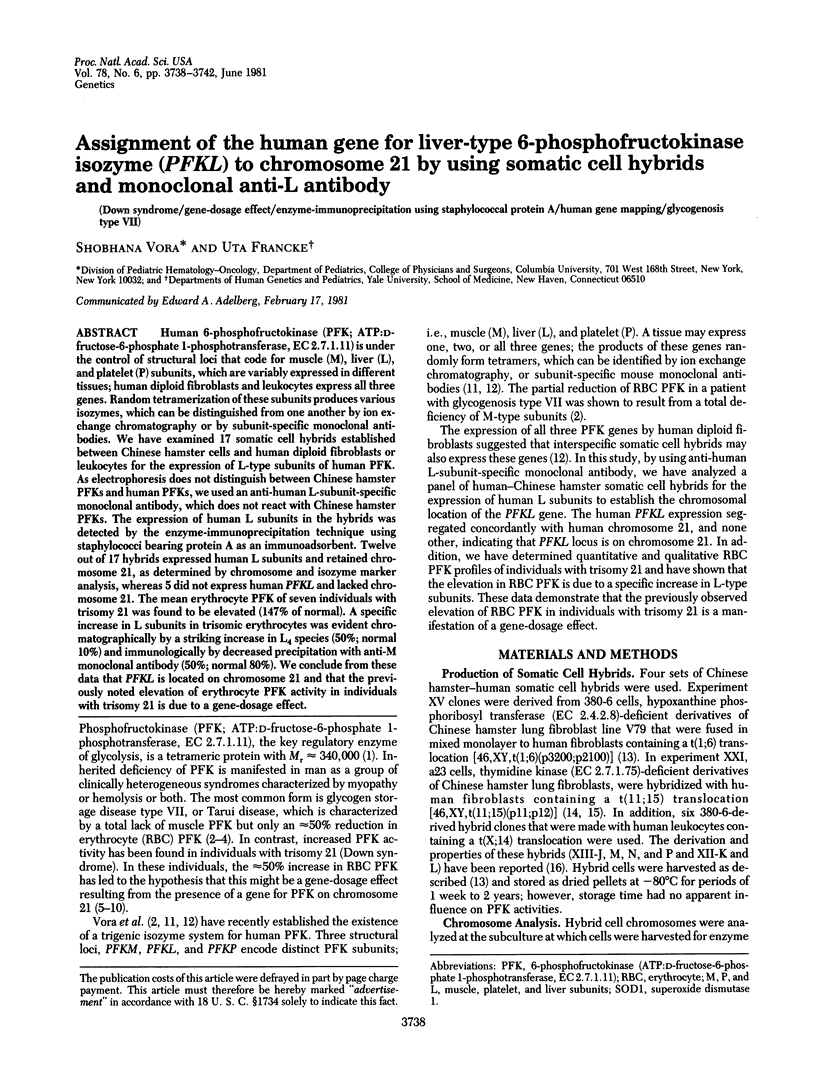
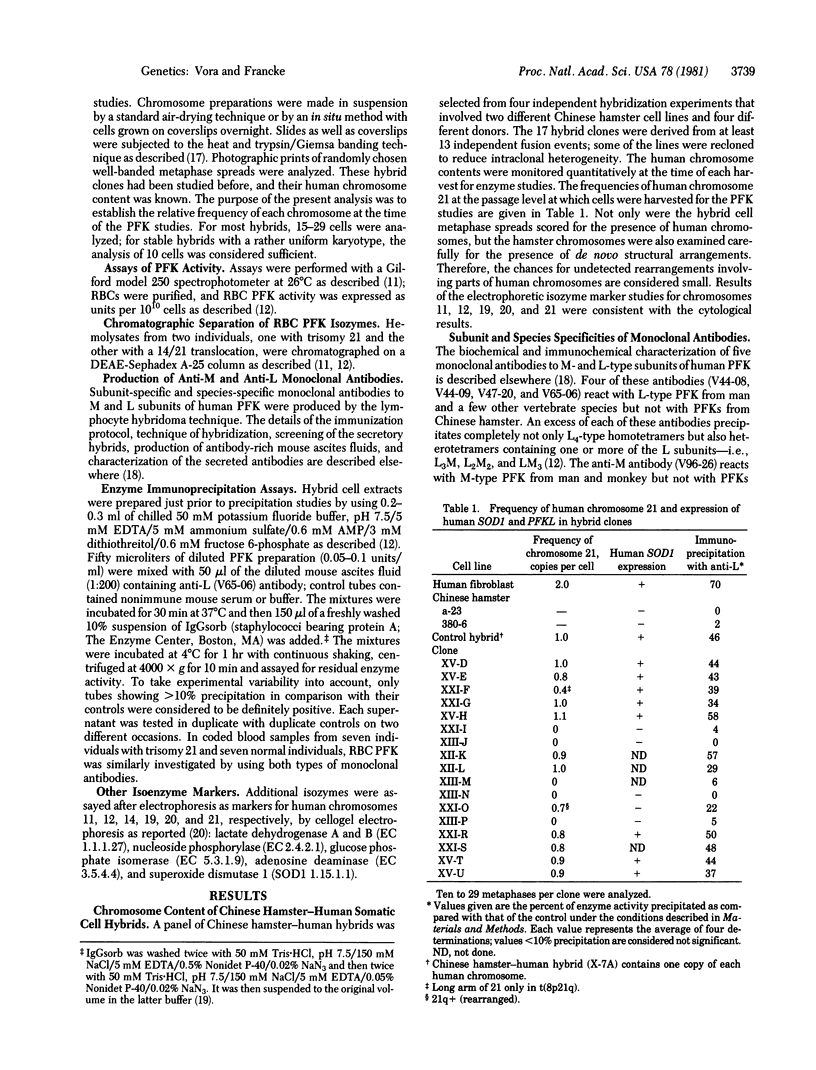
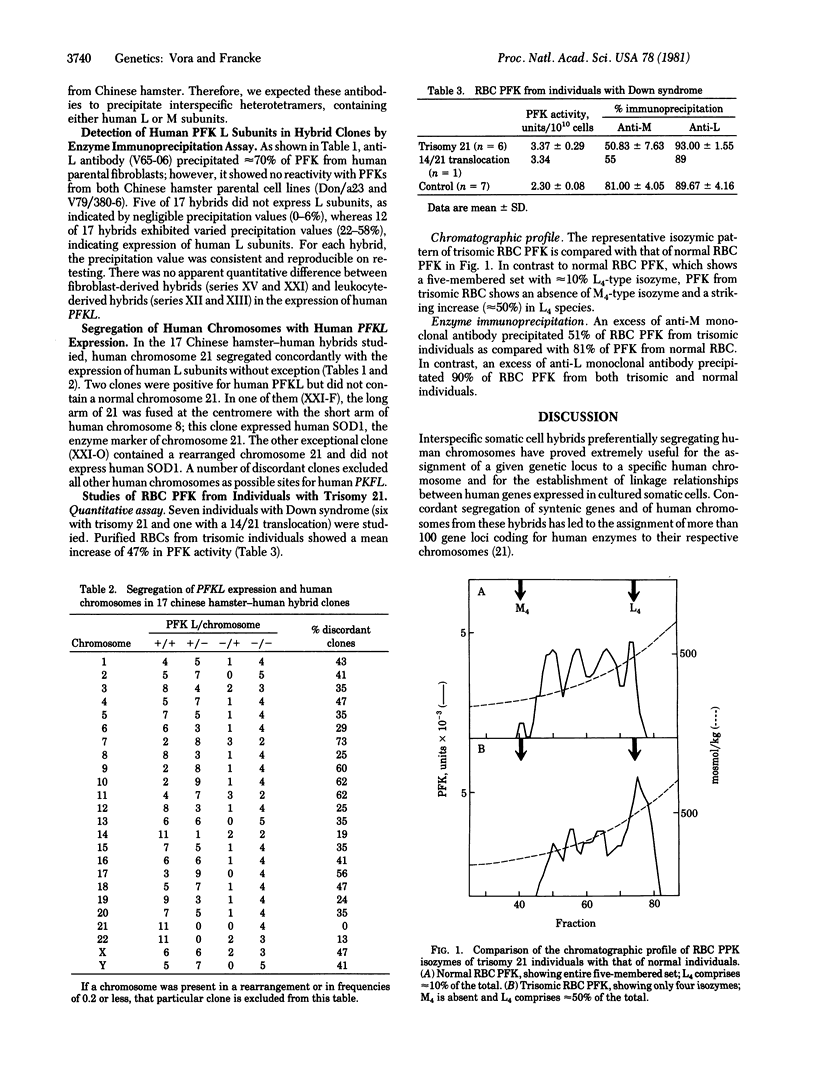
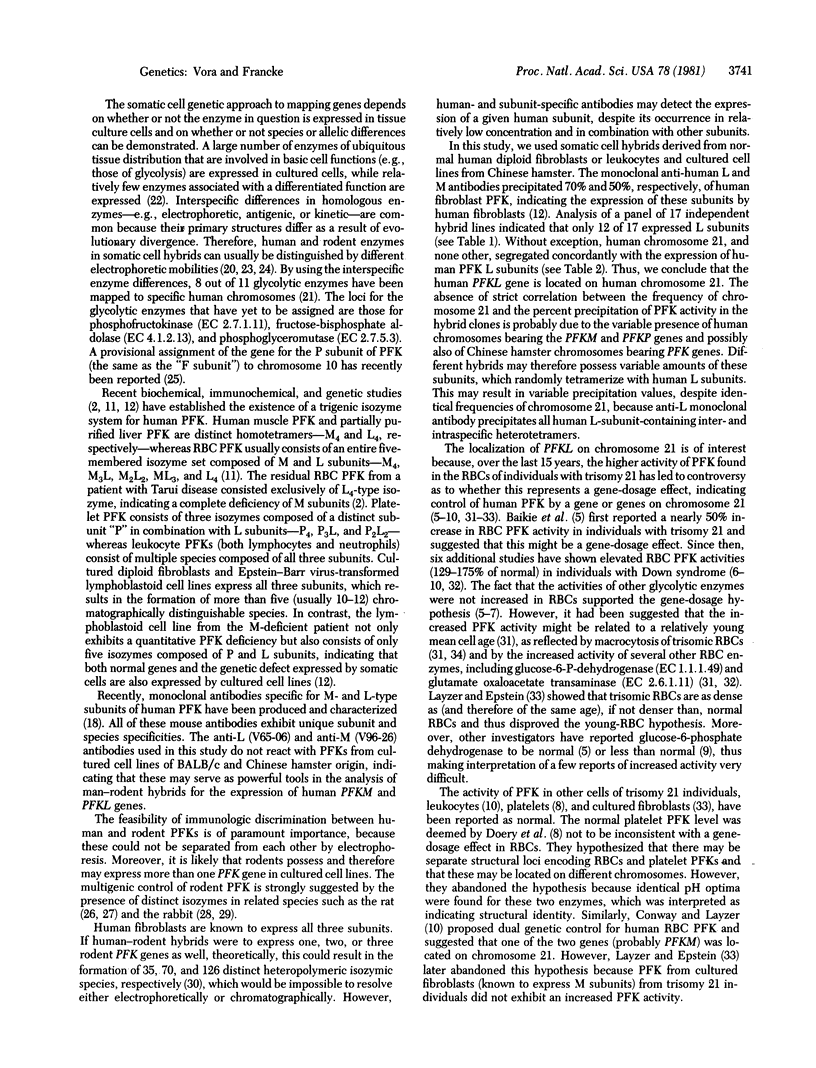
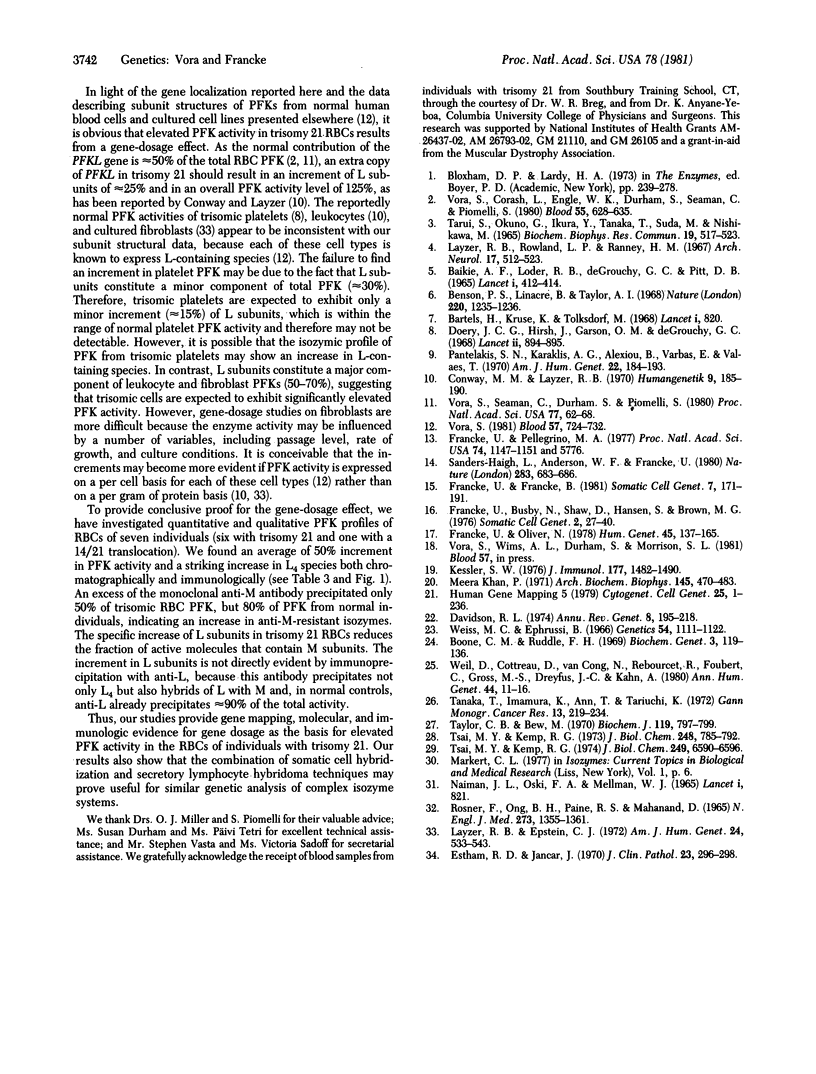
Selected References
These references are in PubMed. This may not be the complete list of references from this article.
- BAIKIE A. G., LODER P. B., DEGRUCHY G. C., PITT D. B. PHOSPHOHEXOKINASE ACTIVITY OF ERYTHROCYTES IN MONGOLISM: ANOTHER POSSIBLE MARKER FOR CHROMOSOME 21. Lancet. 1965 Feb 20;1(7382):412–414. doi: 10.1016/s0140-6736(65)90007-3. [DOI] [PubMed] [Google Scholar]
- Bartels H., Kruse K., Tolksdorf M. Enzymes in Down's syndrome. Lancet. 1968 Apr 13;1(7546):820–820. doi: 10.1016/s0140-6736(68)92266-6. [DOI] [PubMed] [Google Scholar]
- Benson P. F., Linacre B., Taylor A. I. Erythrocyte ATP: D-fructose-6-phosphate 1-phosphotransferase (phosphofructokinase) activity in children with normałG trisomic mosaic Down's syndrome and in normal and Down's syndrome controls. Nature. 1968 Dec 21;220(5173):1235–1236. doi: 10.1038/2201235a0. [DOI] [PubMed] [Google Scholar]
- Boone C. M., Ruddle F. H. Interspecific hybridization between human and mouse somatic cells: enzyme and linkage studies. Biochem Genet. 1969 Apr;3(2):119–136. doi: 10.1007/BF00520348. [DOI] [PubMed] [Google Scholar]
- Conway M. M., Layzer R. B. Blood cell phosphofructokinase in Down's syndrome. Humangenetik. 1970;9(2):185–190. doi: 10.1007/BF00278934. [DOI] [PubMed] [Google Scholar]
- Davidson R. L. Gene expression in somatic cell hybrids. Annu Rev Genet. 1974;8:195–218. doi: 10.1146/annurev.ge.08.120174.001211. [DOI] [PubMed] [Google Scholar]
- Doery J. C., Hirsh J., Garson O. M., de Gruchy G. C. Platelet-phosphohexokinase levels in Down's syndrome. Lancet. 1968 Oct 26;2(7574):894–895. doi: 10.1016/s0140-6736(68)91057-x. [DOI] [PubMed] [Google Scholar]
- Eastham R. D., Jancar J. Macrocytosis in Down's syndrome and during long-term anticonvulsant therapy. J Clin Pathol. 1970 May;23(4):296–298. doi: 10.1136/jcp.23.4.296. [DOI] [PMC free article] [PubMed] [Google Scholar]
- Francke U., Francke B. Requirement of the human chromosome 11 long arm for replication of herpes simplex virus type 1 in nonpermissive Chinese hamster x human diploid fibroblast hybrids. Somatic Cell Genet. 1981 Mar;7(2):171–191. doi: 10.1007/BF01567656. [DOI] [PubMed] [Google Scholar]
- Francke U., Oliver N. Quantitative analysis of high-resolution trypsin-giemsa bands on human prometaphase chromosomes. Hum Genet. 1978 Dec 18;45(2):137–165. doi: 10.1007/BF00286957. [DOI] [PubMed] [Google Scholar]
- Francke U., Pellegrino M. A. Assignment of the major histocompatibility complex to a region of the short arm of human chromosome 6. Proc Natl Acad Sci U S A. 1977 Mar;74(3):1147–1151. doi: 10.1073/pnas.74.3.1147. [DOI] [PMC free article] [PubMed] [Google Scholar]
- Kessler S. W. Cell membrane antigen isolation with the staphylococcal protein A-antibody adsorbent. J Immunol. 1976 Nov;117(5 Pt 1):1482–1490. [PubMed] [Google Scholar]
- Layzer R. B., Epstein C. J. Phosphofructokinase and chromosome 21. Am J Hum Genet. 1972 Sep;24(5):533–543. [PMC free article] [PubMed] [Google Scholar]
- Layzer R. B., Rowland L. P., Ranney H. M. Muscle phosphofructokinase deficiency. Arch Neurol. 1967 Nov;17(5):512–523. doi: 10.1001/archneur.1967.00470290066009. [DOI] [PubMed] [Google Scholar]
- Meera Khan P. Enzyme electrophoresis on cellulose acetate gel: zymogram patterns in mgh-mouse and man--Chinese hamster somatic cell hybrids. Arch Biochem Biophys. 1971 Aug;145(2):470–483. doi: 10.1016/s0003-9861(71)80007-3. [DOI] [PubMed] [Google Scholar]
- Naiman J. L., Oski F. A., Mellman W. J. Phosphokinase activity of erythrocytes in mongolism. Lancet. 1965 Apr 10;1(7389):821–821. doi: 10.1016/s0140-6736(65)92994-6. [DOI] [PubMed] [Google Scholar]
- Pantelakis S. N., Karaklis A. G., Alexiou D., Vardas E., Valaes T. Red cell enzymes in trisomy 21. Am J Hum Genet. 1970 Mar;22(2):184–193. [PMC free article] [PubMed] [Google Scholar]
- Rosner F., Ong B. H., Paine R. S., Mahanand D. Biochemical differentiation of trisomic Down's syndrome (mongolism) from that due to translocation. N Engl J Med. 1965 Dec 16;273(25):1356–1361. doi: 10.1056/NEJM196512162732503. [DOI] [PubMed] [Google Scholar]
- Sanders-Haigh L., Anderson W. F., Francke U. The beta-globin gene is on the short arm of human chromosome 11. Nature. 1980 Feb 14;283(5748):683–686. doi: 10.1038/283683a0. [DOI] [PubMed] [Google Scholar]
- TARUI S., OKUNO G., IKURA Y., TANAKA T., SUDA M., NISHIKAWA M. PHOSPHOFRUCTOKINASE DEFICIENCY IN SKELETAL MUSCLE. A NEW TYPE OF GLYCOGENOSIS. Biochem Biophys Res Commun. 1965 May 3;19:517–523. doi: 10.1016/0006-291x(65)90156-7. [DOI] [PubMed] [Google Scholar]
- Taylor C. B., Bew M. The distribution of two chromatographically distinguishable forms of phosphofructokinase in the tissues of the rat. Biochem J. 1970 Oct;119(4):797–799. doi: 10.1042/bj1190797. [DOI] [PMC free article] [PubMed] [Google Scholar]
- Tsai M. Y., Kemp R. G. Isozymes of rabbit phosphofructokinase. Electrophoretic and immunochemical studies. J Biol Chem. 1973 Feb 10;248(3):785–792. [PubMed] [Google Scholar]
- Tsai M. Y., Kemp R. G. Rabbit brain phosphofructokinase. Comparison of regulatory properties with those of other phosphofructokinase isozymes. J Biol Chem. 1974 Oct 25;249(20):6590–6596. [PubMed] [Google Scholar]
- Vora S., Corash L., Engel W. K., Durham S., Seaman C., Piomelli S. The molecular mechanism of the inherited phosphofructokinase deficiency associated with hemolysis and myopathy. Blood. 1980 Apr;55(4):629–635. [PubMed] [Google Scholar]
- Vora S. Isozymes of human phosphofructokinase in blood cells and cultured cell lines: molecular and genetic evidence for a trigenic system. Blood. 1981 Apr;57(4):724–732. [PubMed] [Google Scholar]
- Vora S., Seaman C., Durham S., Piomelli S. Isozymes of human phosphofructokinase: identification and subunit structural characterization of a new system. Proc Natl Acad Sci U S A. 1980 Jan;77(1):62–66. doi: 10.1073/pnas.77.1.62. [DOI] [PMC free article] [PubMed] [Google Scholar]
- Weil D., Cottreau D., Nguyen Van Cong, Rebourcet R., Foubert C., Gross M. S., Dreyfus J. C., Kahn A. Assignment of the gene for F-type phosphofructokinase to human chromosome 10 by somatic cell hybridization and specific immunoprecipitation. Ann Hum Genet. 1980 Jul;44(Pt 1):11–16. doi: 10.1111/j.1469-1809.1980.tb00941.x. [DOI] [PubMed] [Google Scholar]
- Weiss M. C., Ephrussi B. Studies of Interspecific (Rat x Mouse) Somatic Hybrids. II. Lactate Dehydrogenase and beta-GLUCURONIDASE. Genetics. 1966 Nov;54(5):1111–1122. doi: 10.1093/genetics/54.5.1111. [DOI] [PMC free article] [PubMed] [Google Scholar]



